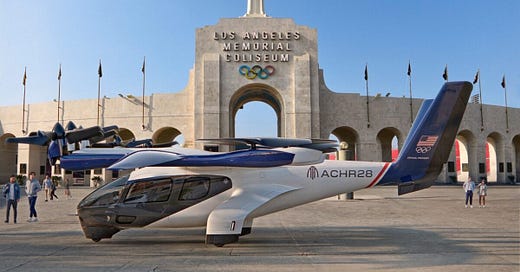Why the LA Olympics Might Be Your First Ride in a Flying Taxi
Archer Aviation’s sky-high collaboration with LA28 signals a new era of innovation, mobility and sponsor integration on the world’s biggest stage as flying taxis prepare to debut at the summer games
Haven't subscribed yet? Join our community of sports enthusiasts eager to broaden their understanding of global sports. Whether you're a student, professional, or business owner, our newsletter provides invaluable insights into the sports industry.
In what feels like a scene plucked straight from a sci-fi script, flying taxis are no longer the stuff of tomorrow. They’re today’s headline. Archer Aviation’s CEO, Adam Goldstein, stepping onto The Tonight Show Starring Jimmy Fallon wasn’t just a clever PR move — it marked a pivotal moment in both the future of transportation and the evolving world of sports sponsorship. With Archer now locked in as the Official Air Taxi Provider for the 2028 Los Angeles Olympics, a whole new category of branding and mobility innovation has taken off. Quite literally.
Adam Goldstein’s announcement on Fallon’s show was more than entertainment; it was a cultural moment (check video below). Rarely do sports sponsorships get unveiled on such mainstream, widely viewed platforms. This wasn’t a logo-on-a-jersey deal. It was the first time most Americans heard that the Olympics will offer flying taxis. The primetime setting gave Archer a head start in public perception, positioning itself not just as a tech company but as a bold, lifestyle-defining brand.
Sports sponsorship has had its share of quirky brand titles from Official Tractor Partner to Official Printer Provider, but an Official Flying Taxi Partner? That’s uncharted territory. For LA28 and the IOC, allowing Archer into this exclusive club showcases a new openness to unconventional partnerships, not merely as a revenue stream, but as a statement of vision and relevance in the 21st century.
Los Angeles is infamous for its gridlock. Archer’s air taxis promise to cut commutes from hours to minutes during the Olympics, shuttling VIPs, fans, and athletes alike across the sprawling metropolis. At the cost of a “high-end Uber,” it’s not just luxurious, it’s practical. This is more than novelty; it’s a solution to a decades-old problem, executed at a globally-watched event.
Every Olympic host city hopes to leave behind a legacy. For LA28, the memory may not just be medals and highlights, but infrastructure — vertiports that outlast the Games, changing how locals and tourists move through the city. Archer’s presence sets the stage for LA to become a futuristic urban prototype, like how Tokyo symbolised robotics in 2020.
Who attends the Olympics? Global travellers, high-spending tourists, industry leaders, and heads of state. The brand isn’t just transporting passengers; it’s in fact demoing its product to its ideal audience through their favourite medium/passion point. With every 10-minute flight over LA, the brand isn’t just gaining exposure but also earning validation. That’s sponsorship gold.
Last year, the 2024 Paris Olympics flirted with this concept, but Volocopter’s EVTOL dreams were grounded by delays in regulatory approval. Archer learned from that misfire. By securing FAA recognition and planning multiple vertiports years in advance, they’ve shown a more grounded approach — quite the paradox for a flying company. Timing, regulation, and realism make LA28 not just aspirational but achievable.
Will tourists remember Archer once the Games are over? Quite possibly. If a visitor skips the 405 for a rooftop ride over Hollywood and lands in Santa Monica in 15 minutes, that’s a story they’ll tell forever. Such experiences create emotional brand equity. And when these tourists return post-Olympics, they’ll be looking for the flying taxi app they used during their trip. Which is exactly what the brand would want!
Archer’s move signals a broader shift in sports marketing: from visibility to utility. Today’s fans want brands that enhance their experience, not just sponsor it. Whether it's AI-powered food delivery in stadiums or biometric ticketing, the age of functional sponsorship is here. The new taxi brand is setting the tone, not just riding the trend.
That said, yes, EVTOL (electric vertical take-off and landing) is still maturing. Of course, battery technology has hurdles. But in an industry saturated with traditional sponsorships, unique partnerships like this breathe new life into a stale formula. Innovation is messy — but when it works, it leaves a mark. For the young brand and LA28, the gamble could create a blueprint for tech-sports collaborations for decades to come.
The partnership doesn’t exist in a vacuum. With companies like Volocopter and Lilium developing their own aircraft and ecosystems, we’re witnessing the dawn of aerial mobility, and sports are becoming the demo reel. Brands are realising that if you want to reach millions, fast-track your tech via fandom. And with each Olympic cycle looking for “the next big thing,” don’t be surprised if future Games include AI coaches, metaverse fan zones, or more aircraft zipping across urban skies.
Some housekeeping stuff
If you can’t find the newsletter, check your Spam folder or Promotions tab, and move this email to your primary inbox. Make sure to mark this email address as ‘not spam’.
Today’s recommended podcast…
In this episode, Guy Kinnings, CEO of the DP World Tour and Ryder Cup Europe, offers a front-row perspective into the complexities of running one of golf’s most globally influential tours, clearing up misconceptions about the “European” label and sharing how the DP World Tour operates on a truly international stage.
Guy reflects on how individual stardom shapes tournaments, draws audiences, and influences sponsorships, as well as how events like the Ryder Cup give players a unique shot at sporting immortality.
Looking ahead, the episode unpacks how LIV Golf’s arrival has disrupted the ecosystem, bringing private investment and shaking up traditional power structures. But rather than resist change, Guy sees this as an opportunity to expand the game’s reach and build long-term value in emerging markets.





